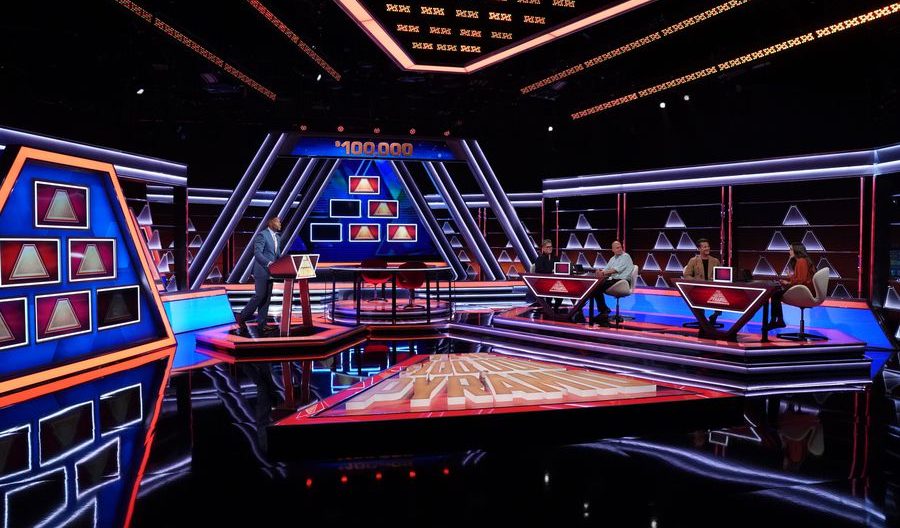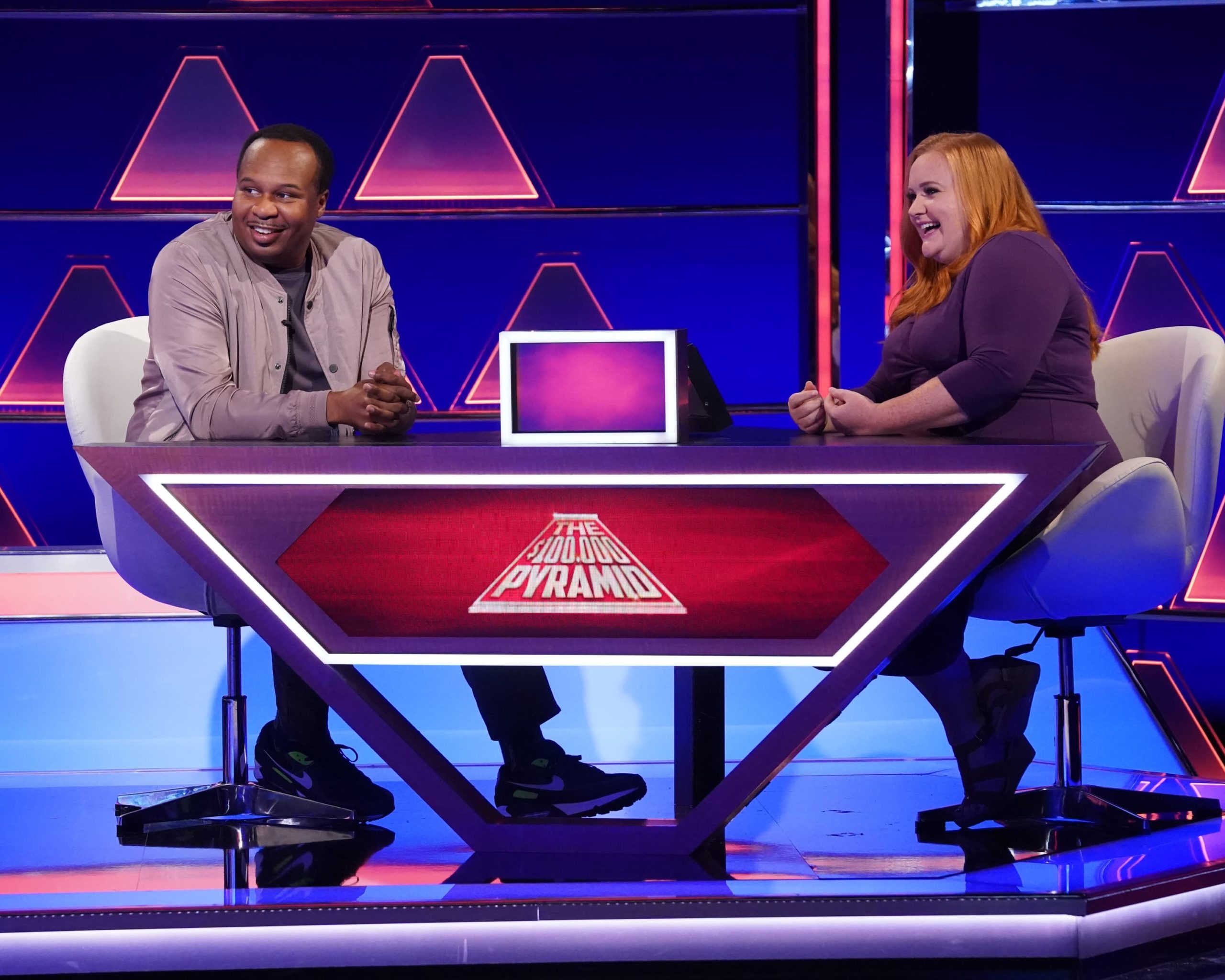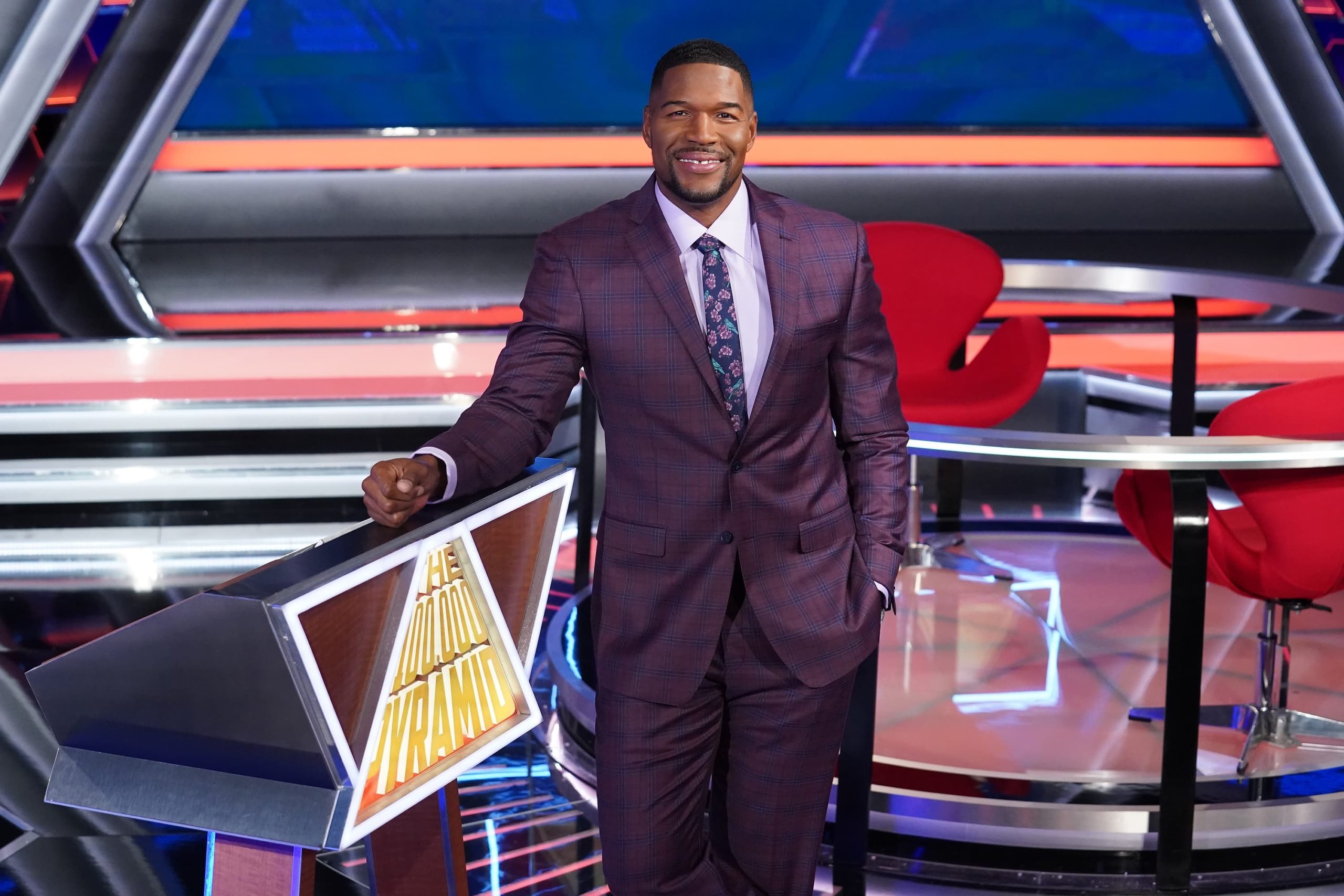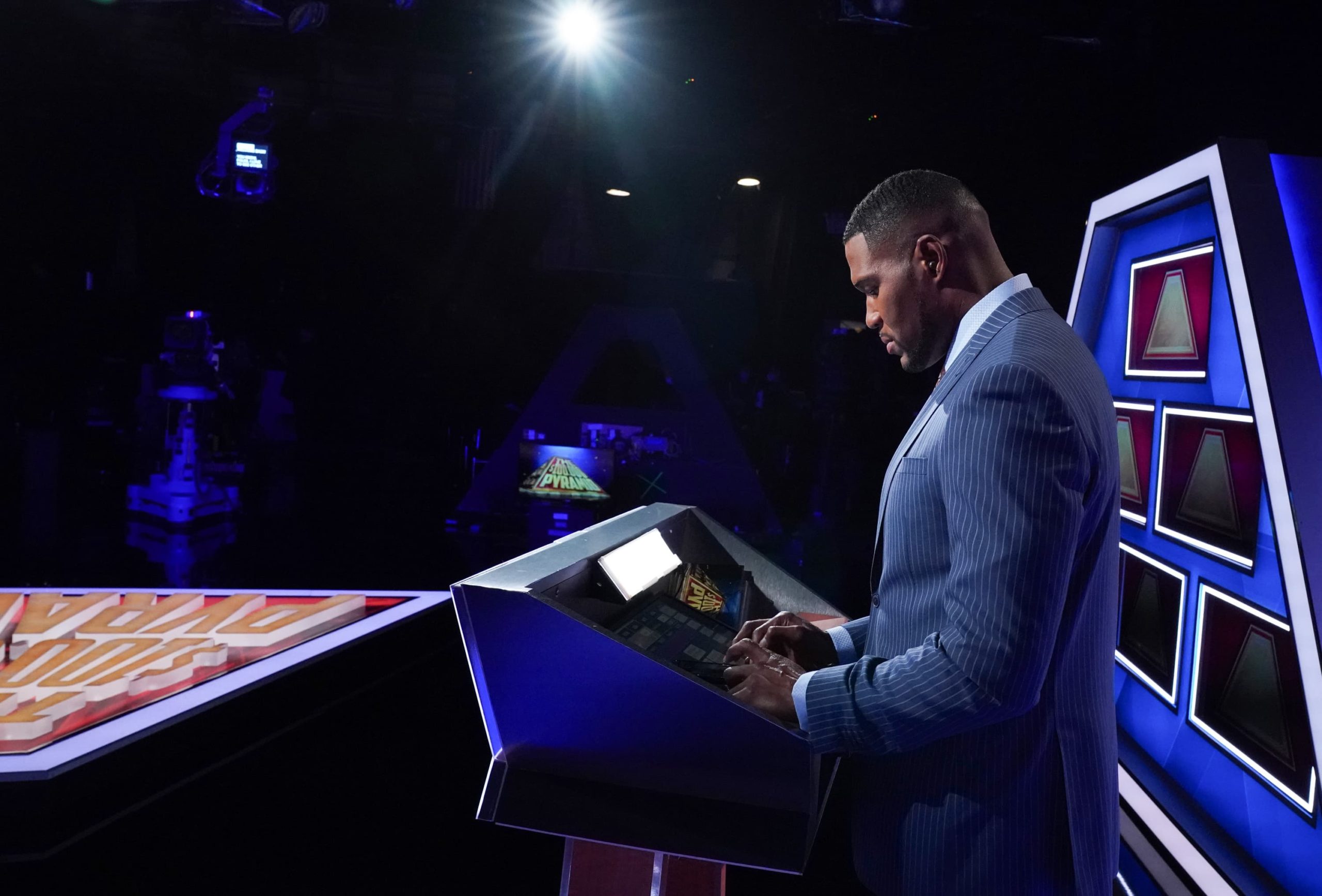
Trilons In The Time of COVID: Pyramid’s 5th Season with EP Vin Rubino
We sat down with Pyramid's executive producer Vin Rubino to talk about the challenges of producing Pyramid in the midst of a pandemic.
BuzzerBlog: I bet it’s been really nice to get back into the swing of things after the past year.
Pyramid EP Vin Rubino: It certainly is. We’ve luckily been able to dodge this sort of like height of Coronavirus and get some stuff done. I’m just hoping things will get to normalcy at some point soon.
It’s been a while since new episodes of Pyramid have been on our screens.
Yes it has. That was of course due to the pandemic.
What challenges did you have in producing Pyramid with COVID protocols in place?
Well, to be honest with you, as we always do, we start pre-production in January. That’s casting and prepping for a shoot in May. And we were probably about a month and a half in, [the games are] pretty much written and we had quite a bit of a casting done when COVID hit. Literally—one day I came into the office, and the next day it was like a ghost town. Everyone was gone. Basically, everybody went off to quarantine.
We didn’t know when we were gonna come back, or if we were going to come back. I spent a good part of the spring and summer on calls with ABC and Sony, trying to figure out when we would get back, and how we would do it. There were just monumental hurdles to overcome, in terms of safety protocols; contestants; celebrities, whether they would want to come or not; and trying to piece together a season that we could shoot and when we get back in the studio.

After multiple months of meeting, we finally landed on shooting—I think it was at the end of August because we had to push past when the governors would allow us to be in the same space, and then there had to be all the right protocols in place for spacious social distancing. Luckily, the way that Pyramid’s set up, the contestants already do sit 6 feet apart. We actually moved them to be 8 feet apart.
We [also] didn’t have an audience so that was a challenge. We also had to get it done before Michael Strahan was off to do football, which we didn’t know was gonna happen either. If I’m not mistaken, we were the first show that back into production post-pandemic. So there was a lot of restrictions that happened last summer, and so much has happened since then, that’s it’s sorta hard to recall, but I just remember contestants that couldn’t make it in because they were their towns wouldn’t let them travel or celebrities that couldn’t come in. And we wound up basically getting as many celebrities as we could get to book on the show who were local. And to be honest with you, it wound up being a great season. Amazing season, quite frankly. And I think it was because anybody that was, was there because they were tired of being locked up to the house and just wanting to get out.
Right, that makes a whole lot of sense. You were you were taping in New York, correct?
Yes we were.
Were the protocols different between LA and New York to your knowledge?
No; as far as I can see, they’re not.
OK, because I think it was Supermarket Sweep that maybe got interrupted, because of, like, the second wave of the pandemic. So it seems like it’s nice that you managed to find that window to kind of go in and get the get the job done.
It’s funny, because it feels like we dodged a bullet a little bit, because they kind of relaxed things a little bit. Things just barely got open. And we’re going to be in the studio in August. We finish at the end of August, when post is supposed to start editing. And then I went to LA in October to start working on the Chase. And we got the Chase shot just before Thanksgiving. And right after that, the pandemic raged back up, so we got those in just under the wire.
So the timing was fortunate, but nothing was planned. It was all luck.
As a showrunner, luck is the last thing you want to have to rely on. But when it falls, it falls good.
Yeah, and I’ll tell you, the pandemic could care less whether you’re producing a game show, a scripted show or a talk show. What’s happening outside determines what we’re able to shoot. There’s a lot of entities involved, so our legal team was constantly in touch with the governor’s office to find out when we will be able to at least get our staff in the same building. And that didn’t happen until middle of August.

I know games like The Price is Right really thrive with an audience. Do you think Pyramid is one of those games that really needs an audience?
I would have never said it didn’t. I’ve always said it needed an audience. But, we were able to pull it off. In reality, especially on Pyramid, when you bring in celebrities, that’s what they do: they’re performers. Jokes don’t land if nobody’s reacting to them. We were able to have enough staff around—socially distanced. I was insistant that all hands in the building had to be on the floor and that included cameramen, staffers and I even had our audience warm up guy there, even though there wasn’t an audience there, to make sure someone was there to react. Because, these people are funny, but you’re hearing crickets if there’s no one there to hear them react.
If you had somebody there on stage to fill in that space, in post, I can then cut in an audience reaction. You’ll never you’ll know the difference, quite frankly. And it worked. Other productions I’ve talked to, they have an audience mixer on the set with a whole rig with applause and speakers. I find that kind of odd and it also makes it a challenge in editing, when you have applause where you don’t want it and you can’t get rid of it. So I think the way we did it was actually the best. And it turned out amazing in post once we cut it together.
I’m used to an audience, but it actually took a lot of pressure off of production because you do run around getting everything together, but once the audience is in there is this energy in the room—we got people here, we gotta get a show on! But we can still do that without an audience. And it worked, I think to great effect.
What do you think is the percentage of celebrities that flew in versus those that were local to New York?
I would have to say, it was all local, I think. I don’t think we flew anyone in because it was very difficult—people couldn’t leave, they couldn’t fly. And we’d need to have the quarantine time and that would cost a fortune to put people in hotels for two weeks to come in. And then there was no guarantee they wouldn’t test positive either.
That’s a challenge to try and find all local-based celebrities who A) are willing to come in and B) can play the game! Because this is not a game for the faint-hearted. We lucked out because there was a lot of a lot of SNL cast members, former and present who are great fans of the show and great players. We had some surprises that actually turned out to be amazing shows.
In particular, Dominique Jackson and Indya Moore from Pose. They were hysterical. And they were great in the game. And Michael just loved it really. It really popped and I was pleasantly surprised by that. Joe Gatto and James Murray from the Impractical Jokers who are friends of mine that I’ve done a couple of shows with. Always great. Rosie O’Donnell, who we love. We had Michael Kosta from the Daily Show with Roy Wood Jr. and they were just crazy. Dr. Oz and his daughter Daphne. Fantastic. Dulcé Sloan was one of my favorites, she was a drop dead riot? I want a bottle of Dulcé Sloan. She’s an amazing talent, she was great. Mario Cantone, of course, is a huge friend of the show. You turn him on and he just goes. He’s a dangerously good player, but he’s so funny.
I think there’s a there’s definitely a collection of… back in the 70s and 80s there were always those collections of Pyramid guests who knew the game inside and out and they were good at and they and they were always fun to watch. I know Mario and Rosie—they’re kind of that new school of just good game players.
Exactly. It’s funny—sometimes you get celebrities who get booked on a show, they’re told what the game is. We test them beforehand. We try to train them as much as possible. But then you see some of them recognize as they get on the stage: “Oh my god, this is very serious, I better get with the program.” And it’s not a hard game, but it is a groove you have to get into. I always try to get as many people who are so willing and loving the idea of playing this game.
Actually, Sara Haines [of ABC’s The Chase] played it with Ali Wentworth, and they have a history together—a great episode. We had two episodes with Joe Tessitore who hosts Holey Moley, and he was hysterical super competitive, super funny. I also loved Ryan Eggold who also was amazingly competitive. Kathy Najimy, too, she’s amazing at this game as well.
Pyramid is—I think one of the purest game show games there is, you know?
I don’t disagree with you.
In my head, there’s games that are very much show, like The Price is Right. It’s a lot of show. (I keep picking on The Price is Right today. I don’t know why—it’s fantastic.) The Wall is a lot of show. But Pyramid is very much game, and I think that kind of lends to its longevity, considering it continues to come back over and over. So I think a lot of people are really looking forward to seeing this new season.
I completely agree with you that first of all, I grew up with it, I love everything about it, and I feel really blessed to have gotten the chance to produce it. Having spent five seasons with the show, I recognize what the genius of that show is. First of all, it was not a perfect game when it first went on the air. But back then, they only had three channels. So a show could get on the air and evolve and develop and refine itself over time. Now you don’t have that luxury, you have to go on the air and be a hit right away. And they made all the necessary tweaks [to Pyramid] by the time I got it in my hands.
The first thing I said to the network was, you don’t wanna change anything. They want to make it an hour, and I said, no no no, this is a show that is a half an hour show. To stretch it into an hour, you’re not doing a service to anybody, especially the format and yourself. So if you want to do an hour, do two half hours modularly. Every 30 seconds, there’s this explosion of what happens when they play the game. And it’s all game. The challenge of the producer is, to make it so that there is enough funny in between. It’s all formatted. But in between that stuff, you want to have enough room for the contestants and the celebrities and the host to joke about things and have fun. And I gotta tell you, that’s what makes it a dynamic show. Because it’s all game and fun in between. And it works, spectacularly. That’s why we’re so proud of it, getting this season done, because people need to see that stuff. And you want to see people win money.

When we reviewed Pyramid, we gave the show a perfect score because It’s the best rating we’ve ever given the game because it absolutely 100% distilled what everyone thought Pyramid should be into this modern version. I mean, we were pleased with the set, we were pleased with the material, we were pleased with the lack of changes that were made to the core gameplay down to the timing, we were pleased with Michael, who seemed to love the game, and he knew and understood what to do without trying to pretend to be Dick Clark.
And that’s all on him too. He said to me, “I’m a player, you’re the coach, you need to show me how to play this game.” And he came in for two weeks every day and rehearsed. I said to him, if you let me show you the backbone of the show, if you memorize this format and all the beats to it, then you can be you. As long as you know where you are in the game and you service that. Think that you’re running a game at a dinner party at your house. And these are all your friends and they’re having a great time.” And to his credit, he worked hard to do that that. He wasn’t going to be Dick Clark himself.
Did you make the Winner’s Circle bigger?
Actually, no. The Winner’s Circle has a railing around it… I don’t think that we moved it out. What we did was, we spaced the chairs far enough apart so that there was a good distance. And it’s very awkward when they won, because they couldn’t jump up and hug each other. They were very cognizant of that. Also, we didn’t know when the show was going to air what the [societal] climate was going to be. We considered taking the railing out, but there was enough space, and Michael doesn’t really need to be that close to talk to them.
Any great game show has some kind of mechanics. We built an amazing structure where we put modern flat screens on skateboard wheels on spindles. And there’s two physical guys back there with gloves on following the lights that tell them when to move. You couldn’t do motors; it’d be too much noise. It’s kind of old school meets new school. I knew that’s what people want. That’s what I wanted. I think I was just not dumb enough to change the format. I was smart enough to say, this is a great format, it just needs a modern flair. I’m really glad you guys appreciate it. You guys are big fans of this stuff. And that means that you guys appreciate it.
Michael Strahan returns as host of The $100,000 Pyramid. Rosie O’Donnell, Nate Berkus, Michael Kosta and Roy Wood Jr kick off season five, and it premieres Wednesday, May 26 at 9 PM ET on ABC. This interview has been edited for length and clarity.
